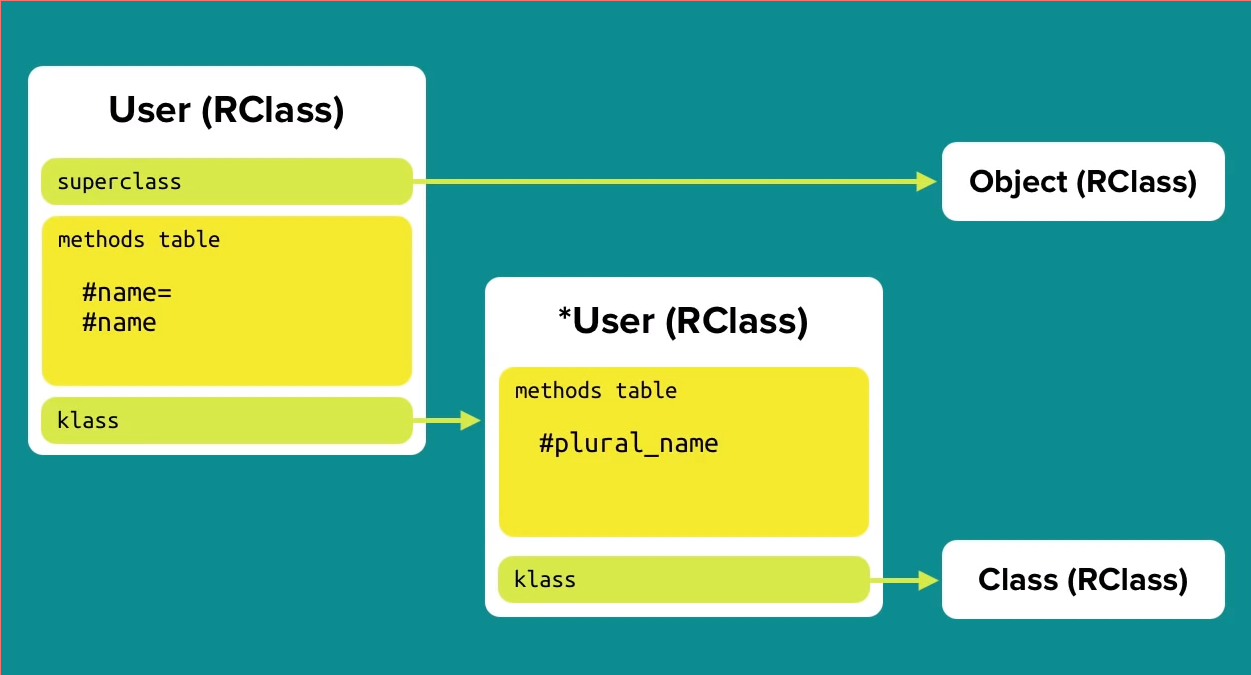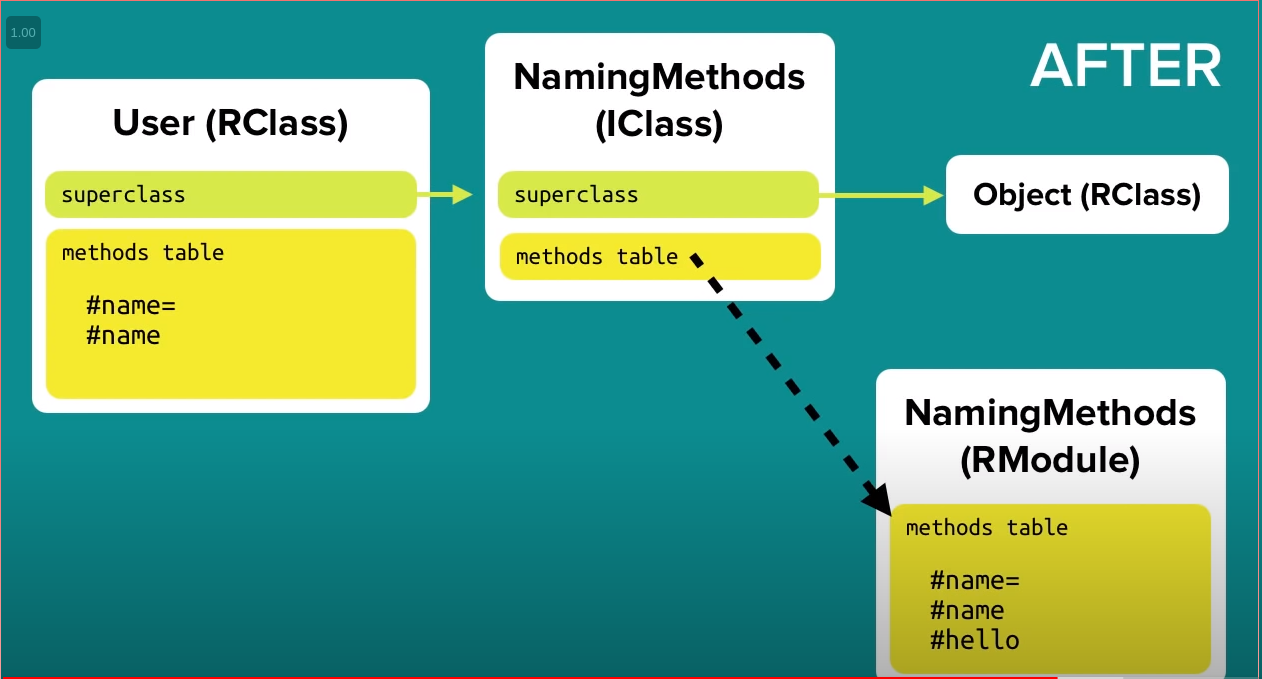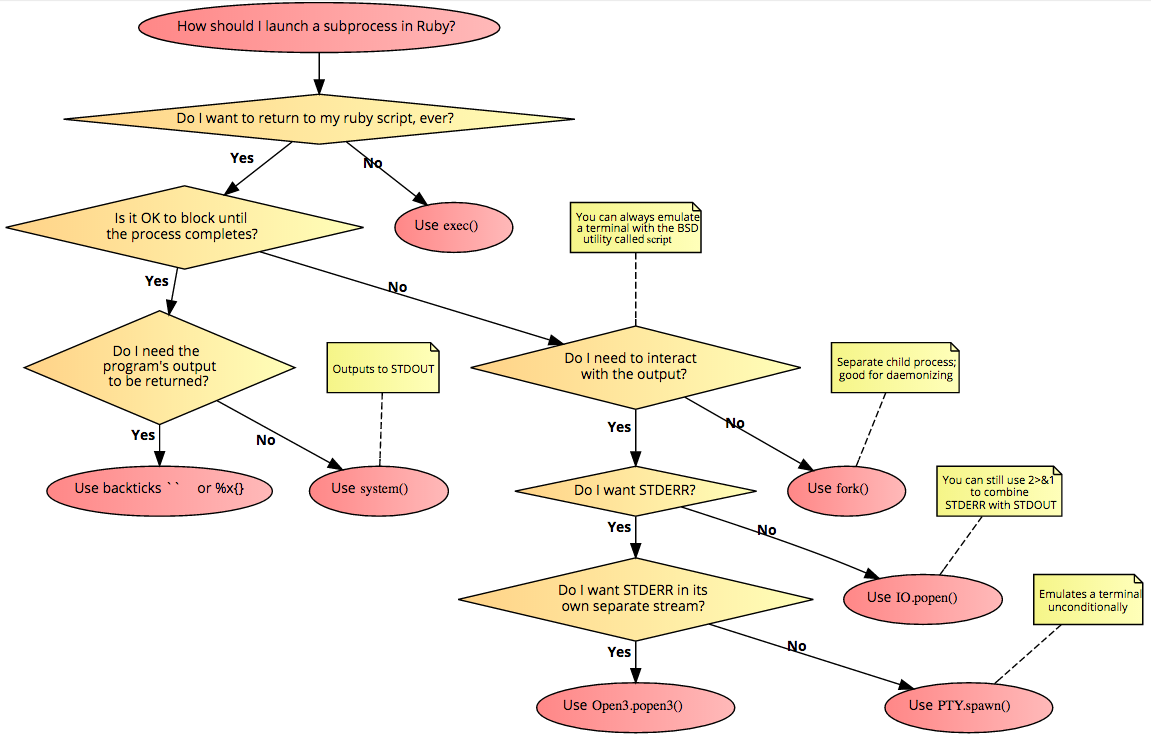tags : Programming Languages
Variable and scope
Variable
- Local variables (
[a-z] or _) - Global variable (
$/$apple) - Instance variable (
@/@apple) - Class variable (
@@/@@apple) - Constant (
[A-Z]/APPLE), Variables that start with a capital letter are constants. nilandselfare pseudo-variables
Class and instance variables are private , so getters and setters are necessary to access the variables outside the class. We can write our own getter and setters using @ and @@ but ruby provides some shortcuts for creation getter and setters of instance variables.
attr_accessor: creates the setter and getter methods.attr_reader: create the getter method.attr_writer: create the setter method.
If using rails, it extends Ruby with both mattr_accessor (Module accessor) and cattr_accessor (as well as _reader=/=_writer versions) to provide getter/setter methods at the class or module level.
There is another thing called class level instance variable which is not a class variable.
# class level instance variable "things"
class Parent
@things = []
class << self
attr_accessor :things
end
end
Parent.things #=> []
Parent.things << :car
Parent.things #=> [:car]Inheritance with variables
- Instance variables are not inherited.
- Class is also an object in ruby. So a class can have instance variables. A class instance variable is not shared by the class’s descendants. (DOUBT: I think i mixed up some shit here.)
- A class variable is shared among the class and all of its descendants.
And then classes have the initilize method which we can use to initilize stuff.
Scope
Scope refers to what variables are available at any given point in time.
OOP
class names tend to be nouns, whereas module names are often adjectives (Stack versus Stacklike).
It seems like in ruby objects(internally) can’t have methods, only classes can. But in practice objects can have methods thaat are implemented by the singelton (*) superclass (sometimes called object’s metaclass or eigenclass). RObject, RClass are the internal representation in the MRI/YARV but not all objects(eg. String) fall into these two classes, they can have their own separate internal representation of what the class looks like.
# 3 kinds of ways we get to see methods in Ruby
class SayHello
def self.from_the_class # class method
"Hello, from a class method"
end
def from_an_instance
"Hello, from an instance method"
# note: name of a instance method and class method can be same!
end
end
hello1 = SayHello.new
hello2 = SayHello.new
hello1.from_an_instance # instance method
# method on specific objects
def hello1.poop
"cool"
end
hello1.poop
hello2.poop # error!
hello1.from_the_class #error! How class methods are implemented,
How class methods are implemented, prural_name is a class method here
Modules
Defined as a collection of methods and constants. The superclass of Class is Module. When using modules, we use the scope resolution operator :: to access stuff inside it. The methods in a Module are only accessible if it is being included in a class. This including is sometime called mixin, so a module sometimes might be called in mixin.
Instead of using include we could also extend which does different stuff. If we use extend, ruby puts the methods from the module to the singleton class of that extending Class, i.e they get added as class methods. We can use extend on objects aswell, then they’ll be added to the singleton class of the object.
If multiple classes include that module, they’ll all point to the same thing.
module MyModule
def self.some_method # a module method
p "Hello, from a class method"
end
end How inclusion of Modules happen (instance methods). Module methods are are not accessible when included in Classes.
How inclusion of Modules happen (instance methods). Module methods are are not accessible when included in Classes.
Aside about
::and.
- The
.operator basically says “send this message to the object”. When you writeobj.meth, you’re sending themethmessage to the objectobj.objwill respond tomethif there is a method body defined for it.- The
::operator “drills down” to the scope defined to the left of the operator, and then calls the member defined on the right side of operator, it can help in accessing additional things such as constants in classes.- There is no difference between
::and.when calling class (static) methods in functionality.::ClassNameCool::ClassNameBool: absolute, gives access to top level from any contextClassNameCool::ClassNameBool: relative
Metaprogramming Ideas
Contexts
There are three implicit contexts in Ruby: self, the scope used for constant lookup, and lastly the default definee.
Execution Context
The execution context contains the variables, the methods and
selffor a given scope.
-
selfThis is the current object and the default receiver.
Evals
- RubyMonk - Metaprogramming Ruby: Ascent - Eval
- Ruby: class_eval vs module_eval. Adding methods or attributes to a… | by Tech - RubyCademy | RubyCademy | Medium
- Understanding class_eval, module_eval and instance_eval - Maurício Linhares’ ramblings
class_eval and instance_eval
A class name is simply a constant which points to an instance of the class Class.
- These methods allow us to evaluate arbitrary code in the context of a particular class or object. The names are confusing doe. These make use of the singleton class and not actually modifying the specified class directly.
class_eval: creates instance method and belongs to theModuleclass, meaning that the receiver will be a module or a class.instance_eval: creates class method and belongs to theObjectclass, meaning that the receiver will be an object. (But also works when reciever is a class (??))
Symbols
# ruby added some syntactic sugar to hash creation
# but it still creates hashes with symbols, eg. querying we need to use symbols
2.6.5 :032 > aab = {user: "Debanga", age: 23}
=> {:user=>"Debanga", :age=>23}
2.6.5 :033 > aab
=> {:user=>"Debanga", :age=>23}
2.6.5 :034 > aab[user]
Traceback (most recent call last):
1: from (irb):34
NameError (undefined local variable or method `user' for main:Object)
Did you mean? super
2.6.5 :035 > aab[:user]
=> "Debanga"
2.6.5 :036 ># symbol-tp-proc
user = {"name" => "Hrihsikesh","age" => 23}
user.keys.map{|key| key.object_id}
# same as above
user.keys.map do |key|
key.object_id
end
# the & converts a symbol to a proc object which can be passed to methods (??)
user.keys.map(&:object_id)Read More:
- Blocks can be converted into a ‘proc’ object
- https://borgs.cybrilla.com/tils/symbol-to-proc-in-ruby/
- https://www.rubyguides.com/2018/10/ruby-map-method/
- https://stackoverflow.com/questions/9468564/what-does-post-all-mapid-mean
- https://stackoverflow.com/questions/27329256/what-is-the-difference-between-a-method-and-a-proc-object
- https://www.rubyguides.com/2016/02/ruby-procs-and-lambdas/
Blocks, Procs, Lambdas and Closures
- Blocks are essentially nameless functions.
yieldis used to call a block inside functions. We use&arg_name_herewhen we want to convert ablockto aproc. - Procs essentially an block which is an object and can be passed around and used as a block. In ruby you can only pass a single block but you can pass multiple procs around in functions. (
Proc.newcan be used and<ProcObj>.callmethod can be used to call it explitcitly). >Proc.newandprocare alias syntax - lamdas These are like proc objects only, but has more things to offer.
- One thing is picky about the arguments, you must pass the arguments to
.call. procsreturn from the context where they are defined.lambdasreturn inside the function where.callwas called from.
- One thing is picky about the arguments, you must pass the arguments to
- closures: What’s interesting about closures in ruby is that the value is not stored in the closure but the reference, so if we mutate the reference to a thing that is inside the closure, we can see updated value upon subsequent access to the closure.
Exception and errors
- All Ruby exceptions and errors are an extension of the
Exceptionclass - In a nutshell, every custom Ruby exception should extend
StandardError, rather than theExceptionclass(ctrl+c).
Misc
Boolean Methods
These are methods that end with a ?, The question mark is a valid character at the end of a method name. They are also called predicates, query. It’s just a convention and there are various examples in the ruby language, any?,=is_a?=,=tainted?=,=nil?= etc. But defined? does not return a bool but still uses ?
There is another place where ? is used to define a character literal (which is a discouraged style)
Destruction
By convention, if a method name ends with an exclamation mark, it does something destructive Eg. reverse!
class << foo block
Idk what this is, the << is the append operator
hash rockets
=>
spaceship operator
a <=> b
Ruby’s % Notation
The parenthesis can be almost any other character such as square brackets %w[...], curly braces %w{...} or even something like exclamation marks %w!...!. All of these have the same behavior (returning an array).
%q[ ] # Non-interpolated String (except for \\ \[ and \])
%Q[ ] # Interpolated String (default)
%r[ ] # Interpolated Regexp (flags can appear after the closing delimiter)
%i[ ] # Non-interpolated Array of symbols, separated by whitespace
%I[ ] # Interpolated Array of symbols, separated by whitespace
%w[ ] # Non-interpolated Array of words, separated by whitespace
%W[ ] # Interpolated Array of words, separated by whitespace
%x[ ] # Interpolated shell commandOther string notations.
Eager Loading in Active Records
There are like 3 ways, preload, eager_load and there’s a third one.
# without any preloading
posts = Post.published.limit(100)
# preloading
posts = Post.published.preload(:tags).limit(100)
# querying on the relationship that was preloaded
posts = Post.published.preload(:tags).where(tags:{name: "Rails"}).limit(100)
# eager_loading
posts = Post.published.eager_load(:tags).limit(100)
# querying on the relationship that was eager_loaded
posts = Post.published.eager_load(:tags).where(tags:{name: "Rails"}).limit(100)
# use include to automatically select one between eager_load or preload
posts = Post.published.includes(:tags).limit(100)
=begin
performance of preload vs eager_load is roughly similar,
but includes chooses eager_loading when querying on the loaded relationship.
=endKernel Module
- https://codequizzes.wordpress.com/2014/04/22/rubys-kernel-module/
- https://stackoverflow.com/questions/38289634/why-does-the-ruby-module-kernel-exist
The ||= thing
a ||= b # this behaves like a || a = b and NOT like a = a||bMusings
- In ruby you can have an Array as the Key of a Hash object.
- I think nice way to think about modules and interfaces in Ruby
- programmatically check if an object will respond to a method call (or any message for that matter) from whatever calls the method, using
#respond_to?(:some_method) - This is possible because Rails implements an autoload system. It uses Module.const_missing to detect when you try to reference a constant that hasn’t been loaded. It then loads the files it believes should contain the constant. This works most of the time, but there’s a catch.
- The creator of ruby worked for Heroku, hence so many things ruby is related to Heroku. And DHH we all know.
- Plain Old Ruby Objects (POROs) LOLOL.
- Rails autoloading --- how it works, and when it doesn’t
- Note: Zeitwerk relies on the convention that each file will define the constant that is named after the name of the file (meaning that /comment.rb should define theComment constant). Luckily, this is not surprising for a normal Rails app. So
Constantsnot only mean the constants we’re familiar with. - Reopening a class
Snippets

Links
Ref
- Ruby QuickRef | zenspider.com | by ryan davis
- Rails: Following and Notifications
- Ruby’s Switch Statement is More Flexible Than You Thought
To Read
- https://ruby-hacking-guide.github.io/
- ruby - What is the difference between Integer and Fixnum? - Stack Overflow
- Ruby on Rails — This Week in Rails: Getting Ready For Ruby 2.4
- https://github.com/rubocop-hq/ruby-style-guide#no-character-literals
- The Singleton module in Ruby - Part I | by Tech - RubyCademy | RubyCademy | Medium
- An Introduction to Procs, Lambdas and Closures in Ruby - YouTube
- http://rubylearning.com/satishtalim/writing_our_own_class_in_ruby.html
- https://web.stanford.edu/~ouster/cgi-bin/cs142-winter15/classEval.php
- http://rubylearning.com/satishtalim/more_on_strings.html
- Class and Instance Variables In Ruby // RailsTips by John Nunemaker
- https://www.toptal.com/ruby/ruby-pattern-matching-tutorial
- https://www.youtube.com/watch?v=UogjRwGl7k0
- https://www.jimmycuadra.com/posts/self-in-ruby/
- The Magic of Class-level Instance Variables | AppSignal Blog